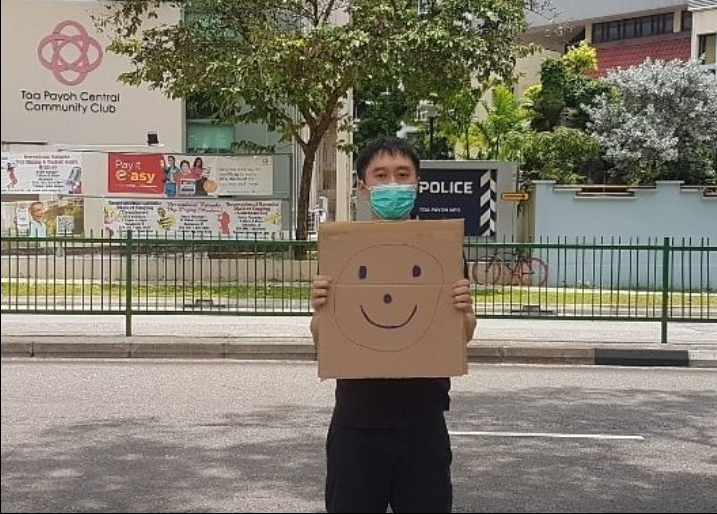Singaporean activist and social worker Jolovan Wham, whose silent protests including a smiley face display have landed him in court in the tightly-regulated city-state, says he is just trying to push back against a deeply entrenched culture which frowns on dissent.
“All we want to do is to be able to speak out and to push for change that will be for the betterment of society and the country,” said Wham, 41, in a recent phone interview with HKFP.

Wham was fined SG$8,000 (now HK$46,190) in February this year for a silent protest he co-organised in 2017, where several blindfolded activists held up a book on a train. They were marking the 30th anniversary of the arrest and detention of 22 social activists and volunteers under the Internal Security Act in 1987.
Wham eventually paid SG$2,500, and chose to serve a 22-day jail sentence in lieu of the remainder. “Instead of paying the fines, I decided to serve a prison sentence,” said Wham. “I chose that because I wanted to make a point.”
This was not Wham’s first interaction with the authorities. He has previously been convicted of illegal assembly on several occasions. In November last year, in a case which made international headlines, he was charged after displaying a smiley face cardboard sign outside a police station and is awaiting sentencing.
Wham said his lone protest was intended to show support for a climate change activist who was questioned by police for taking a picture at the same spot, and also to “test the limits of the law.”
“I chose the smiley face because I wanted to say that youths going on climate strike and activists are not necessarily just negative, angry people,” Wham said. “I also did wonder whether the government would charge [me] for just holding up a smiley face sign.”

The activist was also found guilty of organising an illegal assembly in 2019, over an indoor conference he staged in 2016 at which Hong Kong activist Joshua Wong was one of the speakers.
In Singapore, locals can organise protests and rallies without a police permit only at Speakers’ Corner, which is a designated area in Hong Lim Park, but any events involving a foreigner will require police approval.
Authorities citing the coronavirus pandemic have now closed down Speakers’ Corner, a move which Wham described as unjustifiable. “Other kinds of gatherings are allowed, you can eat at a restaurant…so why is it that protests are not allowed?”

Wham’s actions may seem restrained, especially compared to the protests in Hong Kong, but the activist described his tactics as “controversial,” partly because of how Singaporeans view acts of defiance.
“I think Singaporeans, in general, see protests as disruptive,” said Wham. “Most people just tend to look at protests as something which is not allowed here, so we shouldn’t do it.”
The activist said the government had “successfully demonised civil society and political activists,” with Singaporeans taught to think that the only way to be “involved in political activism has to be activism that is approved by the government.”
The media has also contributed to society’s negative view of activism, he said. “Because we don’t have a free press, the Singapore newspapers tend to portray people who are involved in protests as dangerous and undesirable,” said Wham.

Wham said self-censorship was “deeply entrenched” in the Singaporean press, even for international media based in the country.
“I think they tend to be quite careful with what they say and what they write about Singapore,” the activist said, adding that there have been cases where permits were not renewed for foreign journalists because they did not adhere to the “editorial line of the government.”
In 2020, Singapore ranked 158th among 180 regions in Reporters Without Borders’ World Press Freedom Index. The report said the city “does not fall far short of China when it comes to suppressing media freedom.”
“Prime Minister Lee Hsien Loong’s government is always quick to sue critical journalists, or apply pressure to make them unemployable, or even force them to leave the country,” the report read.
Singapore’s leaders have often used legal means against their critics. A Singaporean blogger was ordered to pay SG$133,000 in damages after he shared an article on Facebook which linked the prime minister to the Malaysian 1MDB corruption scandal.

In addition to limited press freedom, Wham said the Singaporean government was also able to “entrench their own narrative of a prosperous Singapore where everyone is satisfied.”
“I’m not saying that the quality of life for all Singaporeans or even the majority of Singaporeans is poor,” said Wham. “But it’s just that very little attention has been put on these critical issues.”
Wham, who also voices concerns over rights for Singapore’s LGBT community and migrants, said the lack of attention to critical issues had led the international community into thinking that “everything is fine” in the country.
However, despite his numerous run-ins with officialdom, he is still optimistic about the future.
“If we don’t continue engaging in acts of dissent, if we don’t speak out, then we will only normalise fear, we will only normalise political passivity,” said Wham. “I still am [hopeful], and I’m not the only one.”
Support HKFP | Policies & Ethics | Error/typo? | Contact Us | Newsletter | Transparency & Annual Report | Apps
Help safeguard press freedom & keep HKFP free for all readers by supporting our team

LATEST FROM HKFP
HKFP has an impartial stance, transparent funding, and balanced coverage guided by an Ethics Code and Corrections Policy.
Support press freedom & help us surpass 1,000 monthly Patrons: 100% independent, governed by an ethics code & not-for-profit.










